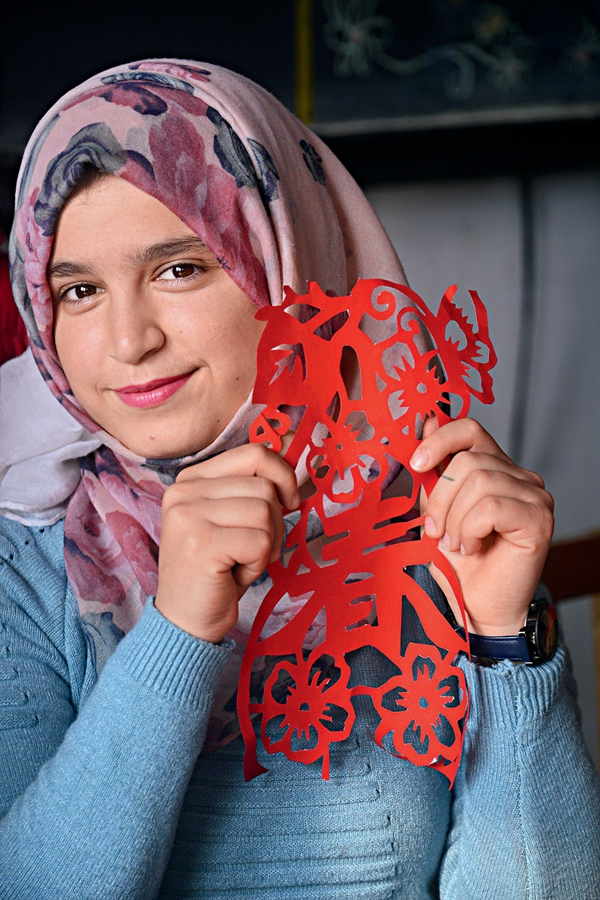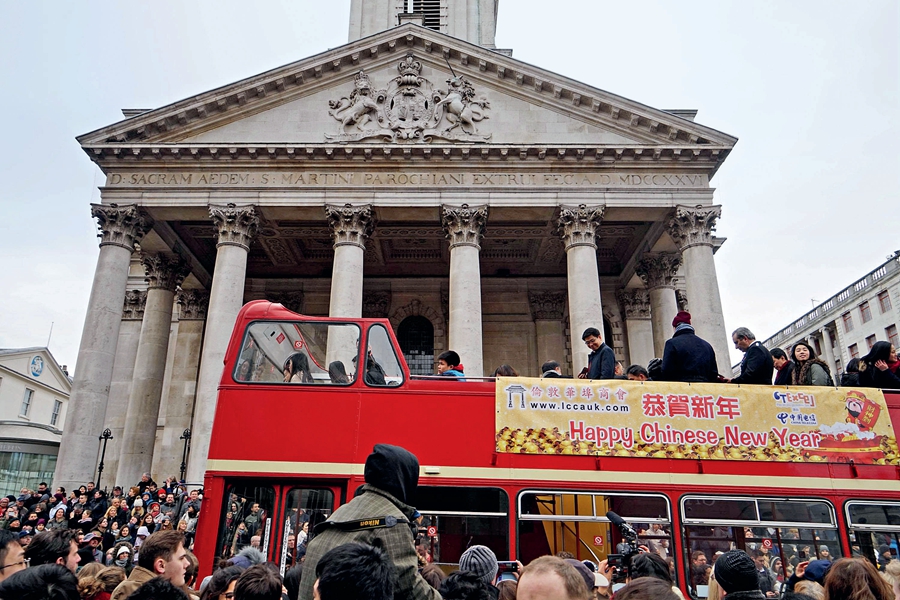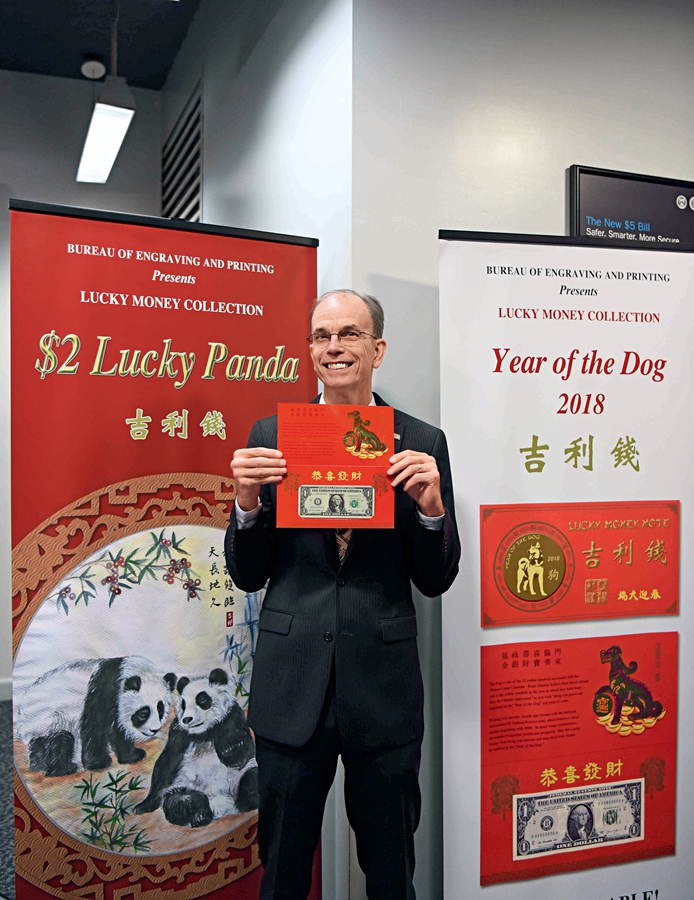AGAINST the backdrop of sweeping economic globalization, interactions and exchanges among ethnic groups, races, and nationalities have become increasingly frequent, leading to the blending of cultures. Countries have taken the way of “mutual learning” with regards to cultural exchange, which is what Chinese President Xi Jinping promoted, rather than the old pattern of confrontation.

A Jordanian student in Liaocheng University, Shandong Province, shows her paper-cutting work.
Spring Festival is the most celebrated festival in China, and now is extending its presence across the world. As Chinese youths celebrate Christmas, Westerners also acknowledge Spring Festival. It indicates the trends of mutual learning and harmonious coexistence between civilizations, which are expected to contribute to the building of a shared future for humankind.
Spring Festival marks the first day on the Chinese lunar calendar. On that day and over the following two weeks, people greet each other by saying “good luck in whatever you do” or “happiness for all your families.” Streets and houses are decorated by Chinese knots and other items of red color. In many foreign countries, traditional Chinese activities are performed as a fixed program, such as the dragon dance, the Peking Opera, shadow puppetry and puppet shows, adding diversity to local cultures.
Why is a time-honored festival so vibrant and even celebrated in other countries? The answer is, from my point of view, the rich, positive connotation of Spring Festival is of great significance in modern society and in reality.
Showing Amity
Spring Festival embodies the spirit of amity. More than 2,000 years ago, Confucius said all people in the world are sisters and brothers. He further pointed out that we should do unto others as you would have others do unto you.

A festooned double-decker bus drives through Trafalgar Square as crowds group around celebrating the 2017 Spring Festival.
The spirit of amity is deeply ingrained in Chinese society and psyche, and has shaped Chinese people’s perception of and expectation for intra-family and inter-state relations as well as state governance. For individuals the spirit of amity allows them to maintain harmony with the complex external world, thus reaching a state of peace within their internal world.
The customs of Spring Festival are just the reaffirmation of Chinese people’s reverence to amity. On its eve, all family members, no matter how far they live, will come all the way back for a happy family reunion dinner. People pay tribute to the heaven and the earth, and offer sacrifices to their ancestors. Children wish New Year greetings to grandparents, and receive red envelopes filled with cash from them. Visiting relatives and friends is also an important activity during Spring Festival, drawing people-to-people relations much closer.
On this planet, there are more than seven billion inhabitants, and we should live in peace, watch out for each other, and build a better world. However the world faces real threats from ultranationalism, religious extremism, terrorism, and wars. Against such a backdrop, Spring Festival and the idea of amity it upholds enhance the spirit of universal peace.
Expressing Gratitude
Spring Festival is a time for expressing gratitude. Gratefulness is a Chinese virtue, exemplified by quite a few sayings or idioms – “the best conduct is repaying a favor,” and “a drop of water in need shall be returned with a burst of spring in deed,” to name a few. The epitome of gratefulness is filial piety, Chinese believe. The great philosopher Mencius (372-289 BC) said, of all which a good man can attain to, there is nothing greater than honoring his parents.

Leonard Olijar, director of Bureau of Engraving and Printing, unveils a new Lucky Money product on November 14, 2017 in celebration of the Chinese Lunar New Year of Dog.
A regular activity during Spring Festival is offering sacrifice to the heaven and the earth, and to ancestors. The rites are meant to show gratitude to the origin of life, as Chinese believe human beings are children of nature, and descendants of forefathers.
Today, it is hard to retain the spirit of gratefulness in the context of prevailing consumerism and hedonism. However, a feeling of gratitude serves the emotional base for harmonious relations between people and between humankind and nature. During Spring Festival, people are reminded of the sense of gratefulness, and they are willing to express gratitude to those around them.
Respecting Diligence
Spring Festival is also a salute to another Chinese virtue, diligence. Chinese people believe that only with their own hands can people create a happy and beautiful life. As many idioms exhort, God rewards the diligent, hardwork makes up for lack of intelligence, and diligence brings luck while extravagance leads to defeat. Traditional performances staged during Spring Festival mostly mimic daily working scenes such as harvesting and fishing, paying tribute to hard work.
In a time when ideas such as selfishness and speculation are eroding the society, Spring Festival provides an opportunity to praise hard and honest work.
Sharing Cherished
Spring Festival also calls for sharing, a value long cherished by Chinese. Mencius told his disciples what a man of virtue is like, “In dire straits they would develop their own goodness. Successful, they would share their goodness with the whole world.” The sense of duty and altruism, as Mencius’s words reveal, have been upheld and followed by those who pursue a noble character.
Like the old saying goes, good fortune should be shared, and misfortune be faced together. The value could still be perceived from Spring Festival customs in some rural areas, where people bring foods to a public venue and have fun together by having games or performances. As protectionism is rising, some countries wish to secure their own prosperity at the expense of others. Such actions affect the harmony and common prosperity of all humans. On the contrary, the sharing concept is expected to propagate as Spring Festival spreads across the world.
As Spring Festival has been celebrated for millennia, rich cultural connotations have been accumulated and become an important part of Chinese civilization. Nowadays the culture, calling for friendship, gratefulness, hardworking and sharing, is contributing to the world civilization for a happy, harmonious, and beautiful future for humankind.
Chinese President Xi Jinping once remarked: “Civilizations have come in different colors, and such diversity has made exchanges and mutual learning among civilizations relevant and valuable... Civilizations are equal, and such equality has made exchanges and mutual learning among civilizations possible... Civilizations are inclusive, and such inclusiveness has given exchanges and mutual learning among civilizations the needed drive to move forward.”
The growing popularity of Spring Festival demonstrates the diversity, equality, and inclusiveness of civilizations, and contributes to exchanges between them.
SHEN XIAZHU is an associate research fellow at the School of International Relations and Public Affairs, Fudan University.





